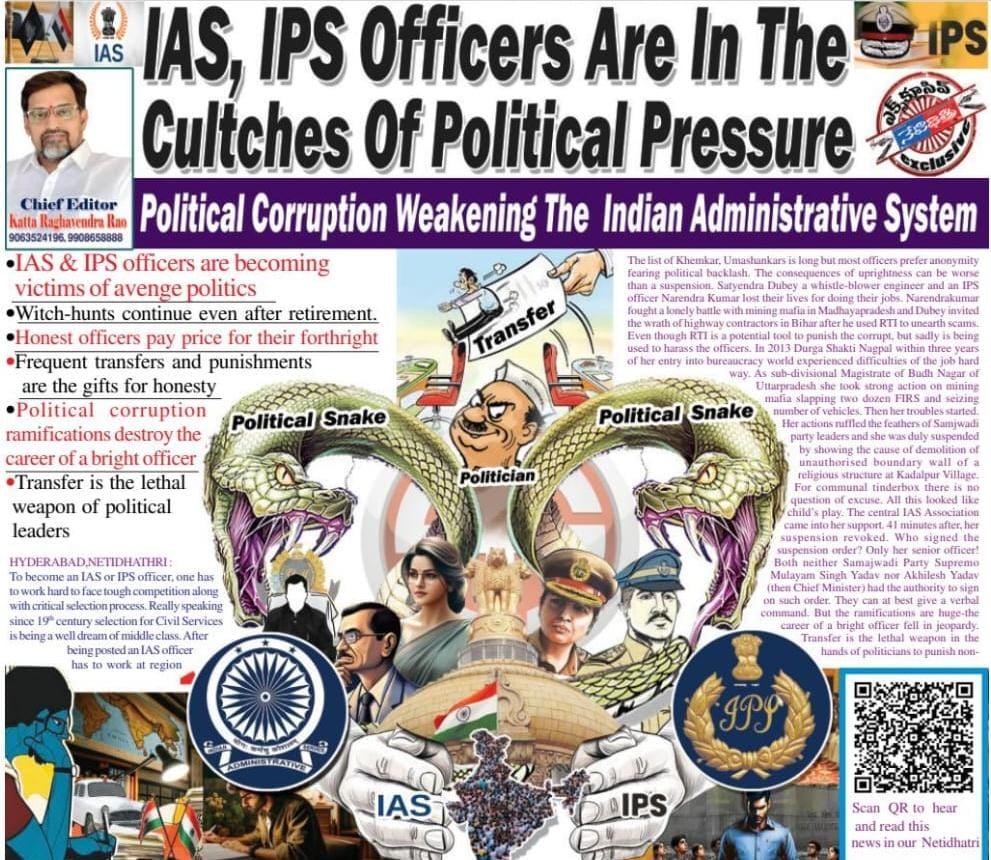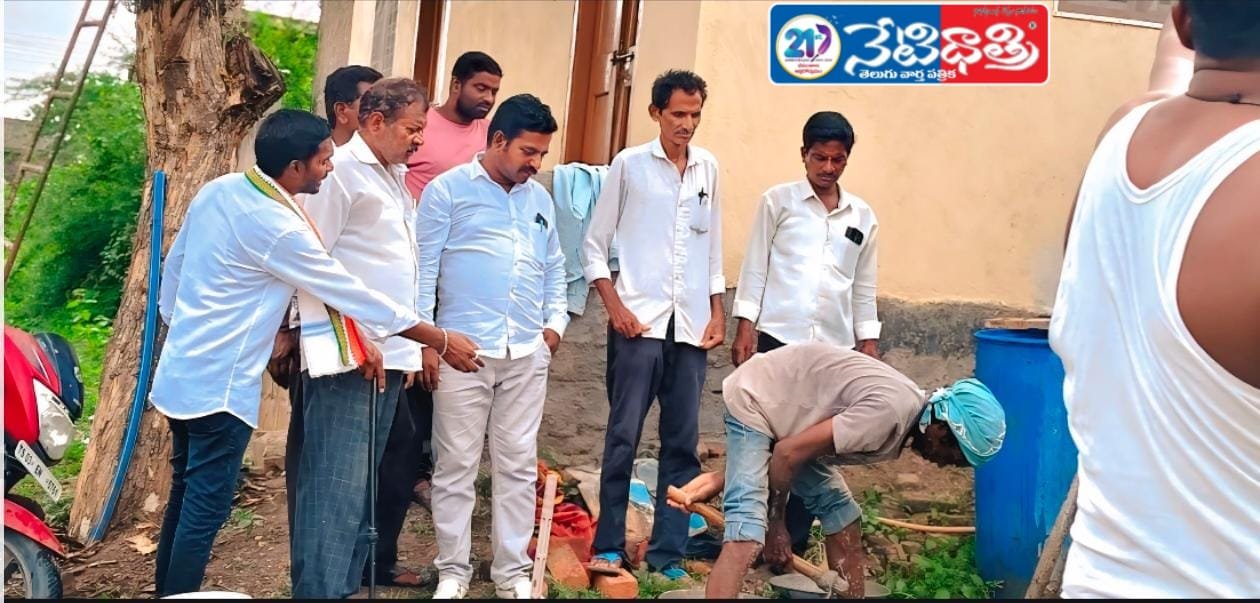·Political corruption weakening the Indian Administrative System
·IAS & IPS officers are becoming victims of avenge politics

·Witch-hunts continue even after retirement.
·Honest officers pay price for their forthright

·Frequent transfers and punishments are the gifts for honesty
·Political corruption ramifications destroy the career of a bright officer
·Transfer is the lethal weapon of political leaders
To become an IAS or IPS officer, one has to work hard to face tough competition along with critical selection process. Really speaking since 19th century selection for Civil Services is being a well dream of middle class. After being posted an IAS officer has to work at region level with coordination of MLA or MP. They both have to work for the welfare of the people bringing development and peace to the society. The first and foremost problem faced by the IAS officers is the dispute with the political leaders with difference of opinion. This has become a challenge due to corruption, usage of public office for personnel use and protection given by MLA and MPs to noted criminals. The main reason for this problem is outdated personnel procedures in Indian Civil Services and lot of political interference causing pressure on IAS officers. In most of the cases IAS officers either subjected to transfers or kept under the dread of suspension. IAS like vital positions must be held by efficient officers, instead filled with inefficient or weak officer’s leads to decline of the system. Everything relays on the impulses of the minister and sometimes transfers are very often one can get 5-6 transfers in a year.
Anxiety and stress
The IAS officers encounter greatest anxiety and stress when they need to face substantial number of vulnerabilities and constantly changing the work place. When an IAS officer has low capacity to control outside varieties the stress reaches to new high levels. The young officers who join civil services have a high option about themselves, because most of them extract inspiration from movies. But the reality is different when they come across to face odd experiences in different situations. Excellence is an art won by training and habituation. An IAS officer work may not get recognition every time. It is not mandatory one also. The overall our governance system is unpleasant. At first glance it would seem that not very many are morally good. Honest IAS officers have to deal with many shortcomings in their career, due to the political corruption.
Unable to serve people
Due to above said reasons the IAS officers who occupy all senior administrative positions in states and Centre have not been able to improve development out comes to citizens. In some circumstances especially most corrupt political party comes into power some of the IAS officers also become part of that corruption which leads to total collapse of system. Best example for this is the tenure of Laluprasad Yadav in between 1990-2005 when Bihar bureaucracy totally collapsed where corruption reached to peak level. It was an unfortunate situation where honest IAS officers could not work.
Prey for political bosses
Despite numerous checks and balances a bureaucrat is an easy prey for political leaders and corrupt officers. In some cases witch-hunts continue even after retirement. It should not surprise then that honest officers are often at the receiving end. In 2013 Ashok Khemka of Haryana cadre has survived in IAS, but has paid the price for the forthright. The officer was in news for investigating suspicious land deals between realty major IDF and UPA Chairperson Sonia Gandhi’s son-in-law Robert Vadra has been transferred 44 times in his career spanning 22 years. Similarly an IAS officer Umashankar of Tamil Nadu cadre had been transferred 19 times. Umashankar had taken on both J. Jayalalitha and M. Karunanidhi regimes. One he suspended on flimsy grounds. Only after three years his suspension had revoked. Then appeared before a TV channel with his wife Suryalekha and family members and charged that “My suspension was meant to be a shock treatment to the IAS and IPS officials in the state”.
The list of Khemkar, Umashankars is long but most officers prefer anonymity fearing political backlash. The consequences of uprightness can be worse than a suspension. Satyendra Dubey a whistle-blower engineer and an IPS officer Narendra Kumar lost their lives for doing their jobs. Narendrakumar fought a lonely battle with mining mafia in Madhayapradesh and Dubey invited the wrath of highway contractors in Bihar after he used RTI to unearth scams. Even though RTI is a potential tool to punish the corrupt, but sadly is being used to harass the officers. In 2013 Durga Shakti Nagpal within three years of her entry into bureaucracy world experienced difficulties of the job hard way. As sub-divisional Magistrate of Budh Nagar of Uttarpradesh she took strong action on mining mafia slapping two dozen FIRS and seizing number of vehicles. Then her troubles started. Her actions ruffled the feathers of Samjwadi party leaders and she was duly suspended by showing the cause of demolition of unauthorised boundary wall of a religious structure at Kadalpur Village. For communal tinderbox there is no question of excuse. All this looked like child’s play. The central IAS Association came into her support. 41 minutes after, her suspension revoked. Who signed the suspension order? Only her senior officer! Both neither Samajwadi Party Supremo Mulayam Singh Yadav nor Akhilesh Yadav (then Chief Minister) had the authority to sign on such order. They can at best give a verbal command. But the ramifications are huge-the career of a bright officer fell in jeopardy. Transfer is the lethal weapon in the hands of politicians to punish non-pliant officers. Haryna IAS officer Ashok Khemka, UP cadre IPS Amitab Thakur was among hundreds of bureaucrats who faced transfer as a punishment. Many officers sit over files for fear of witch-hunted. Some don’t want to antagonise political bosses as that would lead to their transfer or even suspension.
Exit point for political leaders
In 2012 CBI arrested two IAS officers belong to Andhra Pradesh including home secretary in the Emmar town-ship and illegal mining cases. In this case CBI also questioned some other officers also. Reacting to these arrests IAS officers Association said that CBI is targeting them leaving out ministers responsible for wrong doings. Then Cabinet Ministers hit back top bureaucrats daring them to name corrupt ministers. Meanwhile one Congress party leader agreed that there will be some influences of ministers on IAS officers but there will be no pressure on them. After YSR’s death CBI took up investigations into some projects cleared by his government. Unfortunate thing is that political leaders always have an exit point where as responsible IAS officials were being booked.
Avenge politics
Present Telugu Desam Party Governorment in AP two months back issued an un-conventional memo to 16 IPS officers awaiting official postings with instructions on how to report for duty in the future. The list includes two DGP rank and Additional DGP rank official. As per this internal memo issued they have to report at DGP office at Mangalagiri at 10AM and sign the officer’s attendance register available at officer’s waiting room. They have also directed to record their sign out time before leaving the office. Instructions also given to them to be readily available at any urgent work assigned. It was widely believed that the action against IPS officers is based on allegations from the TDP camp that they were aligned with the then-ruling YSRCP while discharging their duties. If it is true really this act can be considered as politically motivated revenge against them. All these are examples how the irresponsible, corrupt and revenge nature politicians act against such IAS officers who are considered as back bone for administration.











